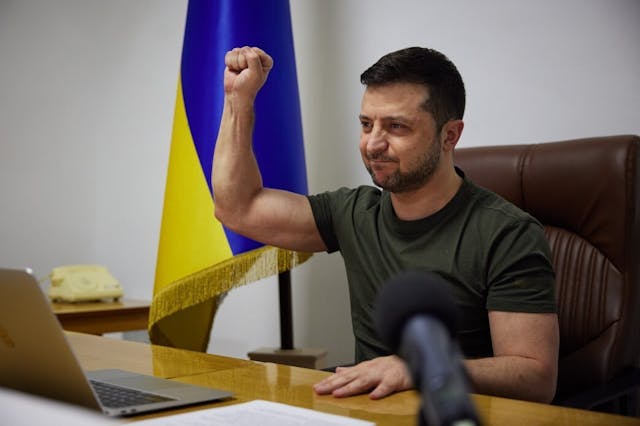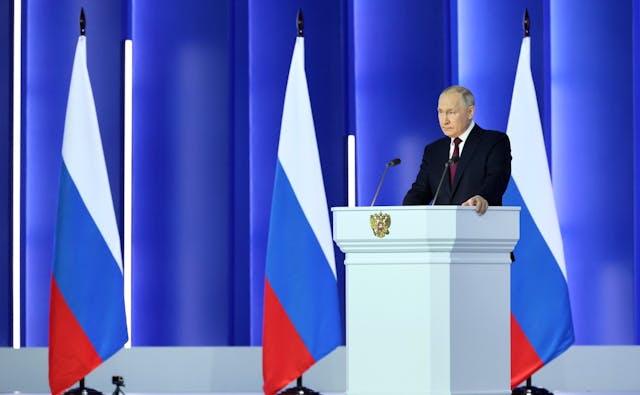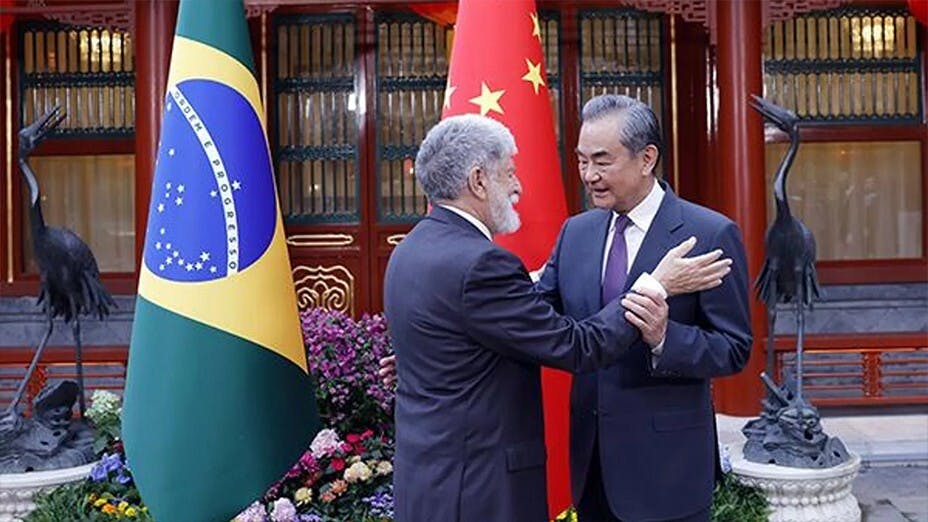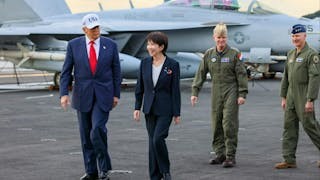中國和巴西最近就解決烏克蘭危機提出的建議,堪稱解決衝突外交的積極一步。然而,由於烏克蘭認為中國較親俄而非政治中立,中巴善意的提議要取得突破,仍然面臨着一些挑戰。
六點共識 勸和促談
2024年5月23日,外交部長王毅在北京會見巴西總統首席顧問阿莫林。雙方就如何解決烏克蘭危機進行了深入討論,雙方達成六點共識:
一、雙方呼籲相關各方遵守局勢降溫「三原則」,即戰場不外溢、戰事不升級、各方不拱火;
二、雙方認為對話談判是解決烏克蘭危機的唯一可行出路。各方應為恢復直接對話創造條件,推動局勢降温緩和,直至達成全面停火。中巴雙方支持適時召開俄烏雙方認可、各方平等參與、對所有和平方案進行公平討論的國際和會。
加大人道援助 避免襲擊平民
三、應加大對相關地區人道主義援助,防止出現更大規模的人道主義危機。應避免襲擊平民和民用設施,保護婦女、兒童等平民和戰俘。支持衝突當事方交換戰俘。
反對使用核武 避免人為核災
四、反對使用大規模殺傷性武器,特別是核武器和生化武器。盡一切可能防止核擴散,避免核危機。
五、反對攻擊核電站等和平核設施。各方均應遵守核安全公約等國際法,堅決避免出現人為核事故。
加強國際合作 維護供應穩定
六、反對割裂世界,製造封閉的政治或經濟集團。呼籲在能源、貨幣、金融、貿易、糧食安全以及保護油氣管道、海底光纜、電力能源設施、光纖網絡等關鍵基礎設施安全問題上加強國際合作,維護全球産業鏈供應鏈穩定。
最後,中巴雙方歡迎國際社會成員支持並加入以上共識,共同為推動局勢降溫、勸和促談發揮建設性作用。

建議出自善意 多國正面回應
中國和巴西達成的建議是善意的,值得讚揚,這是解決烏克蘭衝突的一個非常積極的步驟。一周之內,45個國家對六項共識做出正面回應。
但從現實政治的角度來看,仍存在一些挑戰,需要改善方案,以爭取更多國家的支持,實現真正的外交突破。
澤連斯基有成見 美方指華軍援俄
首先,最重要的是,烏克蘭總統澤連斯基批評中國一直在「努力」阻止一些國家參加下個月在瑞士舉行的和平峰會,烏克蘭最近認為中國在外交上「不支持」此次會議。中方否認了這一點,但烏克蘭對中國的看法無疑是中巴和平建議任何突破的障礙。中國外交部發言人毛寧表示,即使中國不參加瑞士和平峰會,也不代表北京不支持和平。此外,中方主張召開國際和平會議應得到俄羅斯和烏克蘭雙方的認可,各方平等參與,以便公平、平等地討論和平建議。總之,中方認為和平高峰會的條件尚未具備。
據悉,已有80個國家確認出席瑞士和平峰會。
其次,烏克蘭認為中國在政治上親俄,美國批評中國似乎向俄羅斯提供軍事裝備和後勤支持,加深了這種看法。中方否認有此類行為。
據報道,中國一直有向俄羅斯供應軍民兩用物資。這些商品包括機械工具、微電子以及用於軍事武器如坦克、裝甲車、無人機、巡航飛彈和其他設備等的光學零件。中方駁斥了美國和一些歐洲國家的批評,並表示中俄貿易是合法的。
針對有記者問中方一直出口硝化纖維素等軍民兩用物資,幫助俄羅斯生產彈藥、火箭推進劑等問題,外交部發言人汪文斌5月16日表示:「中方在軍品出口方面一向採取慎重、負責態度」,嚴格控制民用無人機等軍民兩用物項出口。美國一邊對中國與俄羅斯的正常貿易進行不實指責,一邊繼續向烏克蘭提供前所未有的軍事援助。這是典型的雙重標準。

峰會恐變烏國主場 普京支持中方倡議
第三、烏克蘭和俄羅斯之間的相互較勁,直接影響了雙方對中巴方案的看法。如前所述,烏克蘭認為中國「親俄」。俄羅斯將瑞士和平峰會視為烏克蘭的主場,以鼓動一些國家支持烏克蘭要求俄羅斯完全從烏克蘭撤軍。俄羅斯總統普京表示,支持中國和平解決烏克蘭危機的倡議。
因此,不信任的政治,仍然是阻礙着所有國家集團提出解決烏克蘭危機的任何建議,包括中國和巴西提出的六點建議。
儘管即將在瑞士舉行的和平峰會被認為是親西方的,但中國─巴西的方案卻被認為是相對親俄羅斯。因此,雙方都無法打破外交僵局。
第四,烏克蘭渴望看到一項能夠立即解決領土爭端的提案,但中巴提案似乎為下一階段領土問題談判奠定了先決條件。
2023年5月,中國和平特使李輝訪問烏克蘭和歐洲時,據報他推動停火的方案將使俄羅斯佔領烏克蘭部分地區──這是烏克蘭所無法接受的。
目前中國和巴西提出的六點建議也迴避了領土問題的討論。因此,除非烏克蘭改變立場,在建立信任並進行詳細談判的過程中變得更加耐心,否則中巴方案可能需要更多微調才能為烏克蘭所接受。
積極倡議綿裏藏針 西方國家暫難支持
第五,中巴提案中的第六點,即反對割裂世界,製造封閉的政治或經濟集團,呼籲在能源供應和其他經濟領域開展國際合作,值得讚揚,但從另一角度看,似是對西方集團的含蓄批評。果如是,中巴共識的第六點可能會引起一些西方國家的不信任,而爭取不到這些國家對該方案的即時政治支持。因此,六點共識可能需要以更謹慎的語氣重新措辭,以尋求西方國家更廣泛的支持。
中巴雙方提出的六點主張,比中國2023年2月《關於政治解決烏克蘭危機的中國立場》12點主張更加具針對性,範圍也小得多。 12點主張包括:(一) 、尊重各國主權;(二)摒棄冷戰思維; (三)停火止戰; (四)啟動和談; (五)解決人道危機; (六)保護平民和戰俘; (七)維護核電站安全; (八)減少戰略風險; (九)保障糧食外運; (十)停止單邊制裁; (十一)確保產業鏈供應鏈穩定; (十二)推動戰後重建。中巴六點共識,傾向於從中方先前的12點主張中,採取出第(三)、(五)、(六)、(七)和(八)點的元素。
黑暗中有一線光明 危機總有希望紓解
總的來說,中國和巴西提出的六點建議,是在解決烏克蘭衝突的艱難道路上邁出的積極的、值得讚揚的一步。儘管如此,由於烏克蘭對中國的認知、烏克蘭與俄羅斯之間的不信任、烏克蘭渴望看到一個合乎自身利益的解決領土問題方案,加上西方經濟集團對俄羅斯的敏感性,倡議解決烏克蘭問題六點建議的中巴兩國,有着良好的和平願望和值得讚揚的和平動機,但也將遇到一些挑戰,需要付出更多的努力、更多的思考,進一步細化和平倡議的內容。黑暗中總有一線光明;世界各國仍懷抱着最好的希望,並且努力不懈地尋求和平解決烏克蘭危機。
The Sino-Brazilian proposal for the Ukrainian crisis and its Challenges
A recent proposal prepared by China and Brazil on the settlement of the Ukrainian crisis can be regarded as a positive step forward in the diplomacy of conflict resolution; nevertheless, due to the fact that Ukraine has perceived China as more pro-Russian than politically neutral, there remain some challenges to achieving a breakthrough in the well-intentioned Sino-Brazilian proposal.
On May 23, 2024, the Chinese Foreign Minister Wang Yi met with Celso Amorim, the Chief Advisor to the Brazilian President, in Beijing. The two sides had in-depth discussions on how to resolve the Ukrainian crisis, and they produced a six-point proposal.
First, the two sides call on all the related parties to observe three principles of deescalating the situation, namely no expansion of the battlefield, no escalation of fighting, and no provocation by any party.
Second, the two sides believe that dialogue and negotiation are the only viable solution to the Ukrainian crisis. All parties should create the conditions for the resumption of direct dialogue and push for the de-escalation of the situation until a comprehensive ceasefire is achieved. China and Brazil support an international peace conference held at a proper time when it is recognised by both Russia and Ukraine, with the equal participation of all parties and the discussion of all the peace plans concerned.
Third, efforts are necessary to increase humanitarian assistance to relevant regions and to prevent a humanitarian crisis on a large scale. Attacks on civilians or civilian facilities must be avoided, while civilians, including women and children, as well as prisoners of war, must be protected. The two sides support the exchange of prisoners of war between the parties concerned in the conflict.
Fourth, the use of weapons of mass destruction, especially nuclear weapons, and chemical and biological weapons, must be opposed. All efforts must be made to prevent nuclear proliferation and to avoid a nuclear crisis.
Fifth, any attacks on nuclear power plants and other peaceful nuclear facilities must be opposed. All parties should comply with international law, including the Convention on Nuclear Safety, and they should resolutely prevent any human-caused nuclear accidents.
Sixth, dividing the world into isolated political or economic groups should be opposed. The two sides call for efforts of enhancing international cooperation in energy, currency, finance, trade, food security, and the security of critical infrastructure, including oil and gas pipelines, undersea optical cables, electricity and energy facilities, and fibre-optic networks, to protect the stability of global industrial and supply chains.
Finally, China and Brazil welcome members of the international community to support and endorse the previously mentioned common understandings and to jointly play a constructive role in de-escalating the situation and promoting peace discussions.
The proposal reached between China and Brazil is well-intentioned and should be commended as an incredibly positive step towards the resolution of the Ukrainian conflicts. Within a week, 45 countries responded positively to the six common understandings.
However, from the perspective of realpolitik, there remain some challenges ahead so that the proposal would be perfected for the sake of galvanising the support of more countries and achieving a genuine diplomatic breakthrough.
First and foremost, Ukraine has recently perceived China as diplomatically “unsupportive” amid the criticism levelled by Ukrainian President Volodymyr Zelenskyy that China has been “working hard” to prevent some countries from participating in a peace summit in Switzerland next month. The Chinese side denied this, but certainly Ukraine’s perception of China remains an obstacle to any breakthrough in the Sino-Brazilian proposal for peace. The Chinese Foreign Ministry spokesperson, Mao Ning, said even if China does not attend the Switzerland peace summit, it does not mean that Beijing does not support peace. Moreover, China insists that an international peace conference should be endorsed by both Russia and Ukraine, with the equal participation of all parties, so that the peace proposal would be discussed in a fair and equal manner. In short, China believes that the conditions for a peace summit have not been met.
It is reported that 80 countries have confirmed their attendance at the Switzerland summit.
Second, Ukraine has perceived China as politically pro-Russian, a perception exacerbated by the criticism made by the US that China has appeared to provide equipment and logistical support for the Russian military. The Chinese side denied such an act.
It is reported that China has been supplying Russia with dual-use goods with civilian and military applications. These goods include machine tools, microelectronics, and optical parts of military weapons like tanks, armoured vehicles, drones, cruise missiles, and other equipment. The Chinese side refuted the criticism from the US and some European countries, saying that its trade with Russia is legitimate.
In response to a reporter’s question that China has been exporting dual-use materials, such as nitrocellulose, to help the Russian production of ammunition and rocket propellants, Foreign Ministry spokesperson Wang Wenbin on May 16, 2024, said: “China always handles the export of military products in a prudent and responsible way, and strictly controls the export of dual-use articles, including drones for civilian use. The US makes false accusations against China’s normal trade with Russia, just as it continues to pour unprecedented military aid into Ukraine. This is typically double-standard.”
Third, the rivalries between Ukraine and Russia have directly affected how both sides may see the Sino-Brazilian proposal. As mentioned before, Ukraine sees China as being “pro-Russian.” Russia has perceived the Switzerland summit as a platform for Ukraine to galvanise a group of countries to support the Ukrainian demand for a total Russian withdrawal from Ukraine. Russian President Vladimir Putin has expressed his backing for China to initiate a peaceful settlement of the Ukrainian crisis.
As such, the politics of distrust remain an obstacle to any proposal made by any group of countries, including the six-point proposal from China and Brazil, to resolve the Ukrainian crisis.
While Switzerland is perceived as pro-western in its forthcoming summit, the Sino-Brazilian proposal is perceived as relatively pro-Russian. As such, neither side can break the diplomatic deadlock.
Fourth, Ukraine is eager to witness a proposal that can deal with territorial disputes right away, but the Sino-Brazilian proposal appears to be one that lays out the preconditions for a next-stage negotiation over territorial issues.
In May 2023, when the Chinese peace envoy Li Hui visited Ukraine and Europe, he was reportedly promoting a ceasefire that would leave Russia occupying parts of Ukraine – a move unacceptable to Ukraine.
The current six-point proposal initiated by China and Brazil also avoids the discussion of territorial issues. As such, unless Ukraine changes its position and becomes more patient in the process of trust-building that would lead to detailed negotiations, the Sino-Brazilian proposal may need more fine-tuning to make it acceptable to Ukraine.
Fifth, the sixth point in the Sino-Brazilian proposal, namely the call for a world divided into isolated political or economic groups, appears to be an implicit criticism of the western bloc, although the call for international cooperation on energy supply and other economic areas is a positive step that should be commended. If so, the sixth point in the proposal may arouse some distrust from some western countries rather than soliciting their immediate political support of the proposal. It may have to be rephrased in an even more cautious tone to seek the wider support of the western countries.
The six-point proposal from China and Brazil is more focused and much narrower than the 12-point position of China on the political settlement of the Ukrainian crisis in February 2023. At that time, the 12 points include (1) respecting the sovereignty of all countries; (2) abandoning the Cold War mentality; (3) ceasing hostilities; (4) resuming peace talks; (5) resolving the humanitarian crisis; (6) protecting civilians and prisoners of war; (7) keeping nuclear power plants safe; (8) reducing strategic risks; (9) facilitating grain exports; (10) stopping unilateral sanctions; (11) keeping industrial and supply chains stable; and (12) promoting post-conflict reconstruction. The Sino-Brazilian six-point proposal tends to extract the elements of points (3), (5), (6), (7) and (8) from the earlier 12-point position adopted by China.
In conclusion, the six-point proposal initiated by China and Brazil is a positive and commendable step forward in the exceedingly difficult path of resolving the Ukrainian conflict. Nevertheless, due to Ukraine’s perceptions of China, the distrust between Ukraine and Russia, the eagerness of Ukraine to witness a proposal that tackles territorial issues the right way, and the sensitivity of the western economic bloc versus Russia, the six-point proposal initiated by China and Brazil with the good intention and laudable motivation of achieving peace is going to encounter some challenges, which call for more efforts and more thoughts in refining its content further. Every dark cloud has a silver lining; countries in the world are still hoping for the best and working diligently in the endless quest for a peaceful solution in the Ukrainian crisis.
原刊於澳門新聞通訊社(MNA)網站,本社獲作者授權轉載。











































